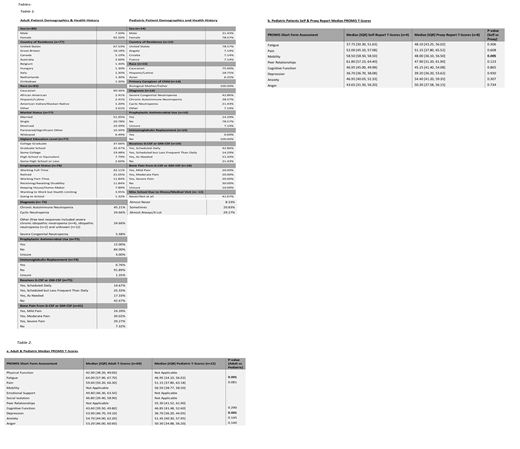Introduction: Few studies have evaluated the quality of life (QOL) in those with chronic neutropenia. We present the largest such study to date with an additional extensive evaluation of patient reported outcomes (PROs) within this patient population.
Methods: Adult & pediatric patients (or their caregivers) aged 5 years or greater electively completed the adult or pediatric PedsQL version 4.0 questionnaire and PROMIS short forms via an online survey tool following solicitation from the National Neutropenia Network. Survey measures were scored according to their respective scoring manuals. PROMIS scoring used item-level calibrations and patient raw scores were translated into standardized T-scores compared to healthy controls (mean 50, standard deviation 10) with higher scores representing more of the concept being measured. For PROMIS interpretations a minimally important difference (MID) between T-scores was considered ½ of one standard deviation. Demographic and health history questionnaires were also provided to participants. Calculated z-scores used means and standard deviations from previously published age-matched healthy controls. Data comparisons used t-test and Wilcoxon rank-sum test analyses.
Results: Eighty adults & 14 children were assessed (Table 1). Chronic autoimmune neutropenia & cyclic neutropenia were the most common diagnoses in adults (45% & 25% respectively); while 43% of children had severe congenital neutropenia (SCN). The majority of adults (57%) receive G-CSF or GM-CSF (15% scheduled daily); 93% felt bone pain from the medication. A greater percentage of children receive G-CSF or GM-CSF (79% overall, 43% scheduled daily) but less (60%) felt bone pain. Bone pain from G-CSF or GM-CSF was rated as moderate or severe in 68% of adults & 40% of children (Table 1).
Compared to healthy individuals (assuming mean of zero), patients surveyed had lower overall total QOL scores with a median z-score of -1.77 and interquartile range (IQR) of -3.48 to -0.23. Based on median (IQR) total PedsQL scores, there was a significant difference in the QOL between adults & children, as adults had a lower overall QOL (-2.12 (-3.54, -0.52) vs -0.17 (-1.71, 0.14); p=0.014). Adults showed no difference in mean total overall PedsQL scores for those with congenital neutropenia conditions (SCN & cyclic neutropenia) (mean 56.47, SEM 4.649) compared to those with acquired neutropenia (chronic autoimmune & idiopathic neutropenia) (mean 59.52, SEM 3.209) (p=0.5931). Pediatric patients with congenital neutropenia conditions (mean 68.37, SEM 5.959) showed a significantly lower QOL than children with acquired neutropenias (mean 85.7, SEM 4.304) (p=0.0428).
Children & adults were noted to have higher overall scores of anxiety & anger compared to healthy controls (did not reach MID). Both groups also had reduced cognitive function scores compared to controls, with adults only meeting MID criteria (Table 2a). While adults had a MID decrease in physical function versus healthy controls, children with neutropenia were noted to have a MID increase in mobility. Adults described having significantly worse fatigue & pain than healthy controls. Interestingly, children with neutropenia had significantly less depression and stronger peer relationships than controls (Table 2a).
Comparable PROMIS analyses between adult & pediatric patients showed a significant difference in fatigue (p=0.001) & depression (p=0.001) with adults noting elevated levels of the parameters. There was nearly a significant difference in pain between the two groups (p=0.081) but no difference in cognitive function, anxiety or anger scores (Table 2a). In-general proxy-reported pediatric PROMIS scores trended towards a negative impact of neutropenia on a child's mental health, mobility, pain, cognition and peer relationships. A significant difference (p=0.005) was noted in PROMIS mobility scores with patients self-reporting improved mobility versus controls and proxies describing reduced mobility (Table 2b).
Conclusions: Chronic neutropenia undoubtedly complexly affects QOL and PROs. Assessments of these parameters by adult patients show a negative impact of the condition most prominently on QOL, physical function, fatigue, & pain. Children with neutropenia had comparable QOL scores to healthy controls but were reported to have fewer depressive symptoms, improved mobility and stronger peer relationships.
No relevant conflicts of interest to declare.
Author notes
Asterisk with author names denotes non-ASH members.


This feature is available to Subscribers Only
Sign In or Create an Account Close Modal